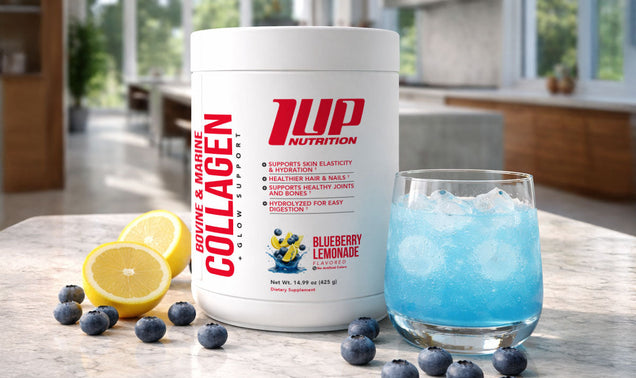When it comes to weight loss, the primary focus is consuming the proper amount of calories or right macro mix. Make no mistake -- calories are king when it comes to losing/gaining weight, but there are also several micronutrients that can also play a pretty big role in transformation challenge.
The best way to ensure you have a robust supply of the essential amino acids, fiber, vitamins, minerals, and healthy fats is to focus on whole foods -- lean proteins, fruits, vegetables, nuts, seeds, legumes, etc. Additionally, you can also incorporate certain supplements to support your intake of crucial micronutrients.
Here are three metabolism-boosting micronutrients for fat loss to keep a lookout for in your nutrition plan:
B Vitamins
B-vitamins are a family of micronutrients that play a critical role in energy metabolism, especially vitamins B6, B12 and folate (B9). Specifically, they help regulate mitochondrial enzymes that allow the body to generate ATP from the metabolism of carbohydrates, protein, amino acids, and fats.
Adequate b-vitamin intake so vital to healthy metabolism that a 2007 review titled The Role of Vitamins and Minerals in Energy Metabolism and Well-Being concluded:
“...and a lack of just one of these vitamins may compromise an entire sequence of biochemical reactions necessary for transforming food into physiological energy.”[1]
Additionally, deficiencies in folate and vitamin B12 reduce endurance work performance, which could lower the amount of calories burned during training -- potentially hindering your weight loss results.
Beyond athletics and body composition, B-vitamin deficiency may open the door for other (more serious) health consequences. Some research indicates that inadequate folate intake can result in an increase in homocysteine, which is regarded as a modest independent risk factor for coronary artery disease.[3]
Foods high in B-vitamins include beef, chicken, eggs, milk, oysters, legumes, and leafy greens.
Zinc
Zinc is a mineral that serves as an essential component of >100 enzymes, several of which are involved in metabolism. Beyond its role in metabolism and weight loss, zinc also plays a prominent role in the proper functioning of the immune system. Deficiencies in zinc can disrupt energy metabolism as well as increase the risk of infection and duration/severity of illness.
Estimates suggest that 43% of men and 45% of women consume less than the recommended daily allowance (RDA).[1]
Zinc deficiency can result from a combination of factors, including not consuming enough foods rich in bioavailable zinc as well as excessive consumption of foods that are high in inhibitors of zinc absorption, such as phytate and calcium. Now, don’t take this to mean that you should avoid foods that contain calcium (dairy products and dark leafy greens) or phytates (grains, nuts and legumes). Those foods have their own benefits and can be included in a nutritious diet.
The takeaway is that there is a balance to one’s diet. Consume foods that are rich in zinc regularly, and there likely isn’t a need to be concerned about the “anti-nutrients” in other foods.
One other thing to consider is that rigorous exercise leads to greater losses of micronutrients involved in weight loss, particularly magnesium, iron, zinc and chromium (which we’ll discuss next).[4,5]
Foods rich in zinc, include red meat, oysters, shellfish, legumes, dairy, eggs, and dark chocolate. Research has also found the supplemental zinc may improve strength and muscle metabolism -- this is why both our men’s and women’s multivitamin formulas (Mult-Go Men & Multi-Go Women) provide robust doses of zinc as well as numerous other essential vitamins, minerals, and metabolism support micronutrients, including B-vitamins, magnesium, iodine, selenium, and vitamin D3.
Chromium
Chromium is a trace mineral that potentiates insulin action, which enhances glucose uptake by the cells. Proper insulin function is critical to nutrient partitioning, energy production, and cardiometabolic health. It’s also necessary for increased energy expenditure and work performance.[6]
As we just discussed, intense exercise can lead to greater losses of chromium[5], which necessitates consuming enough chromium through the diet, or supplementing with products that contain chromium, such as our PM weight loss supplements -- Beauty Dream PM and Recharge PM.
References
- Huskisson E, Maggini S, Ruf M. The role of vitamins and minerals in energy metabolism and well-being. J Int Med Res. 2007 May-Jun;35(3):277-89. doi: 10.1177/147323000703500301. PMID: 17593855.
- Lukaski HC: Vitamin and mineral status: effects on physical performance. Nutrition 2004; 20: 632 – 644.
- Cesari M, Rossi GP, Sticchi D, Pessina AC. Is homocysteine important as risk factor for coronary heart disease? Nutr Metab Cardiovasc Dis 2005;15:140–7.
- Córdova A, Navas FJ: Effect of training on zinc metabolism: changes in serum and sweat zinc concentrations in sportsmen. Ann Nutr Metab 1998; 42: 274 – 282
- Anderson RA, Polanski MM, Bryden NA: Strenuous running: acute effects on chromium, copper, zinc and selected clinical variables in urine and serum of male runners. Biol Trace Elem Res 1984; 6: 327 – 336.
- Lukaski HC: Magnesium, zinc, and chromium nutriture and physical activity. Am J Clin Nutr 2000; 72(suppl): 585S – 593S.






